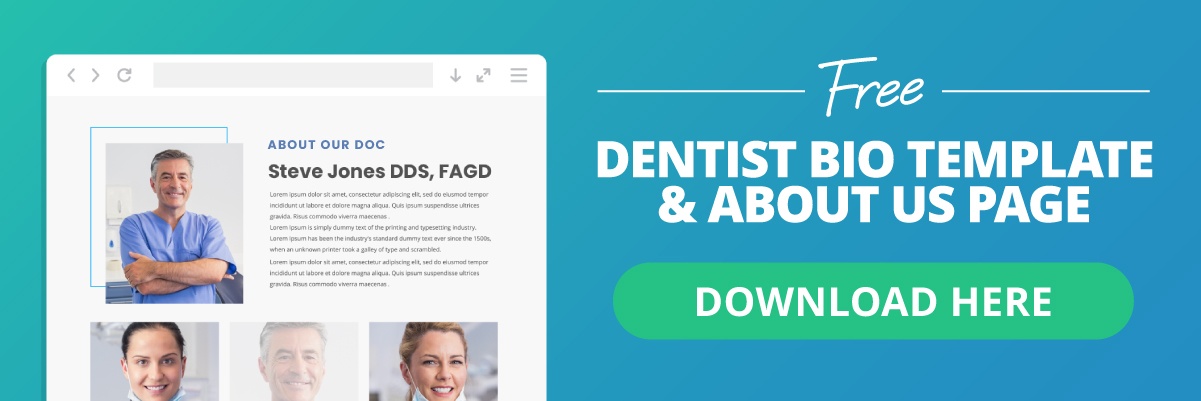
Learn Tips on Responding to Dental Google Reviews
Dentists: If there was only one thing that you had time to do to participate in marketing your practice, what would it be? If you said “responding to reviews” then you’re either a genius or you’ve already read the title of this article!
Many dental practices say that they simply don’t have time to respond to patient reviews, whether they’re on Google, Facebook, HealthGrades, or another online forum. They often prefer to delegate the task to a dental marketing company like ours. Perhaps you never really get started because you just don’t know what to say. Or perhaps it’s a task that keeps falling through the cracks because it just doesn’t seem important.
If that sounds familiar, consider this your wake-up call. About ⅔ of your patients read reviews of your practice before they decide to pick up the phone and make an appointment. 5 Star Google reviews are essential for practice growth, and they’re encouraged when you fully engage in the conversation. Strengthening relationships and demonstrating an open dialogue–both in and out of the office–is one of the best things you can do to help your practice thrive.
Why Responding to Dental Google Reviews Matters
We know that you’re busy. But responding to dental Google reviews has a greater impact than you realize. Reputation management is a big part of dental marketing, and reviews are a key place where that reputation sinks or swims. Let’s take a look at what you can do just by responding to a review.
It Shows Patients That You Care
When your patients see you taking time to respond thoughtfully online, it doesn’t just tell them that you are a practice that listens online… it automatically creates the impression that you listen to patients in the office. Your communication style and persona online are seen as a reflection of how you interact with people when they come into your practice, and this first impression can be hard to change. The way that you address feedback online should mirror exactly how you would respond to someone in your office, voicing their opinions with all your other patients looking on.
It Builds Relationships
Dental offices live or die by the quality of their relationships with their patients and their community. Any opportunity you have to strengthen those relationships should be embraced. Relationships are forged in both good times and bad. Don’t dismiss a negative review as a battle already lost. Your most passionate critics can also become your biggest advocates. Conversely, don’t underestimate the power of a “thank you!” when addressing positive reviews.
It Boosts Your SEO
This one surprises many people. Sure, the overall number of positive reviews may have an impact on your Google Map Pack, but why would responses make a difference? Let’s take a look:
- Google likes to have conversations on its review platform. Responses make reviews more valuable to those who are searching, and Google rewards participating businesses accordingly.
- Google looks at the overall tone of the words used in written reviews. When you add grateful, gracious, affirming responses, you elevate the overall tenor of your reviews.
- The words used in reviews and responses can contribute to your search relevance. For example, a restaurant with reviews praising the soup dumplings is going to be favored in a search for “soup dumplings near me.”
- You just might transform a bad review. It doesn’t happen every time, but it’s definitely not unheard of, and could significantly adjust your overall average star rating.
Little known fact: getting more Google reviews strengthens social media marketing for dentists as well. Make sure your accounts are connected!
It Can Transform Perceptions
You don’t need to convert a negative reviewer to disarm their negative review’s power. As mentioned above, ⅔ of your new patients look at your online reviews before calling you. While you can’t always change the fact that one unsatisfied patient complained about poor services, your response can totally shift outside perception. For example, if the patient is unsatisfied with their filling, or thinks that your reception staff is rude, writing an apology or asking the patient to contact you for a follow-up appointment can help browsers see that you rectify mistakes (whether they’re real or perceived) and are willing to go the extra mile to make things right, even if the reviewer never follows up. For 45% of consumers, seeing that a business responds to negative reviews makes them more likely to visit.
A note before we move forward: if you wish that you were struggling to respond to reviews because your current challenge is actually getting reviews in the first place, we have some suggestions for you. Find out how to get more dental reviews.
Who Should be Responding to Dental Google Reviews?
Now that you are convinced of the importance of responding to reviews let’s go over a stratified plan of approach. First, we’ll talk about the very best practice, and then step down to backup plans, should the ideal plan be unavailable.
Plan A: The Dentist Responds to Patients (The best!)
When a dentist from your practice responds personally to reviews, patients feel like a million bucks. They feel like their voice is heard and valued. It sends a signal to all of your patients–not just the one who wrote the review–that they are the reason you are there. Don’t forget that when a patient stops coming to your practice, it’s usually because they quietly slipped out the back door. They don’t think that it makes a difference to you whether they stay or go. Responding personally to reviews demonstrates how much you treasure a connection with them.
Plan B: A Dental Team Member Responds (Almost as good!)
Plan B is very close behind Plan A. In fact, you may want to alternate between having a team member respond and having a dentist respond, depending on who has the closest personal relationship with the patient. Think of this interaction as an opportunity to extend the relationship that you enjoy within the office out into cyberspace and the time between appointments.
Plan C: Automate Responses (Not ideal, but it’s something)
If no one on your team can find the time to respond to reviews, you still don’t need to let them lie unacknowledged. Automated responses allow you to communicate in a timely manner, even when your practice is slammed. There are numerous tools offering reputation management for dental practices that include automated responses. They can also provide a template when you don’t know what to say, and be customized and signed by a member of your team.
Plan D: Respond to 3 Stars or Lower (Bare minimum!)
If you can do nothing else, respond to reviews of 3 stars or lower. Letting these concerns go unacknowledged is a major oversight that makes you seem callous, out of touch, or too high and mighty to be bothered with your patients’ feedback. You don’t need to be in-depth in each response or bend over backward to fix every situation. Simply say that you’re sorry that they had a less-than-ideal experience and invite them to call you to discuss it further.
Tools and Techniques That Help with Responding to Dental Google Reviews
We won’t go over exactly how to word your response to each review within this article. However, you can find some great resources from Google and some excellent templates to get you started. Instead, we’re going to look at a few practical techniques that can help you be timely and efficient in your responses.
Technique #1: Enable Notifications
Turn on notifications for reviews via your Google Maps app. When these notifications are enabled, a text comes straight to your phone within minutes of the review being posted. It gives you the maximum time to respond and allows you to know what’s being said about you online before everyone else does.
Technique #2: Use a Reputation Management Tool
If Plan A and Plan B above feel out of reach most of the time, you can use a software tool to automate responses. While there are a few options out there for this functionality, we’re partial to our dental reputation management service, MSP Reviews (go figure!) which is built specifically around the needs and language of dental offices. It’s also sensitive to HIPAA-compliant ways to respond to patient reviews. This and similar programs auto-populate the patient’s first name, along with a response that’s specific to the number of stars associated with the review. You can even set up custom notifications that notify you of reviews featuring less than five stars so that you can personally respond to the most essential concerns in a timely manner. Automated responses can be a great way to take your mind off of daily attention to your Google Business Profile. Just don’t forget to personalize whenever possible!
Make a Plan to Engage With Your Patients Where They Are
The hallmark of a thriving practice is an engaged conversation of caring between its patients and its dental team. Don’t let the opportunity for meaningful engagement with reviews pass you by! If you’re low on reviews, take a look at our complimentary Google review campaign materials. Once you have the reviews, pay attention to what your patients are saying.
Take time to discuss the value of responding to reviews correctly with your dental team and set up an internal process that prioritizes it as much as possible. And remember: we’re always here if you need a helping hand to walk you through technical setups or discuss best practices.
Let your patients know that they are the reason you do what you do!
About the Author: Christine Hill is a dental marketing expert and a key member of the dental marketing team at My Social Practice. My Social Practice is located in Salt Lake City, Utah. Christine is passionate about helping dental practices attract new patients through effective dental marketing services.









